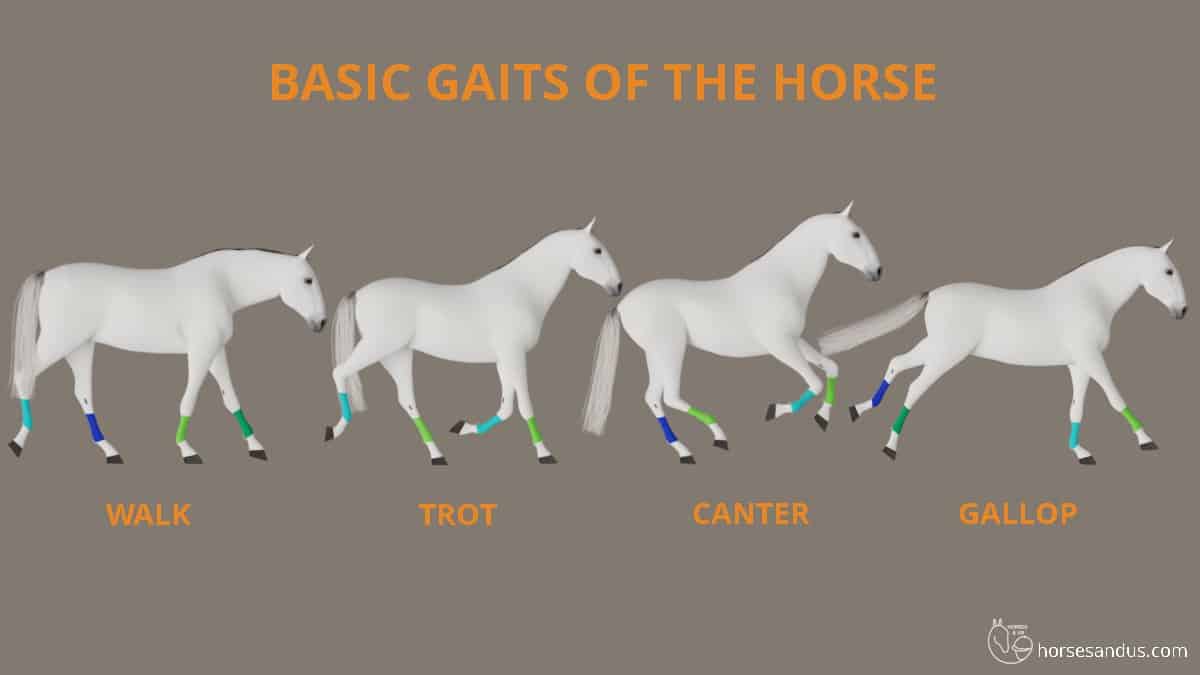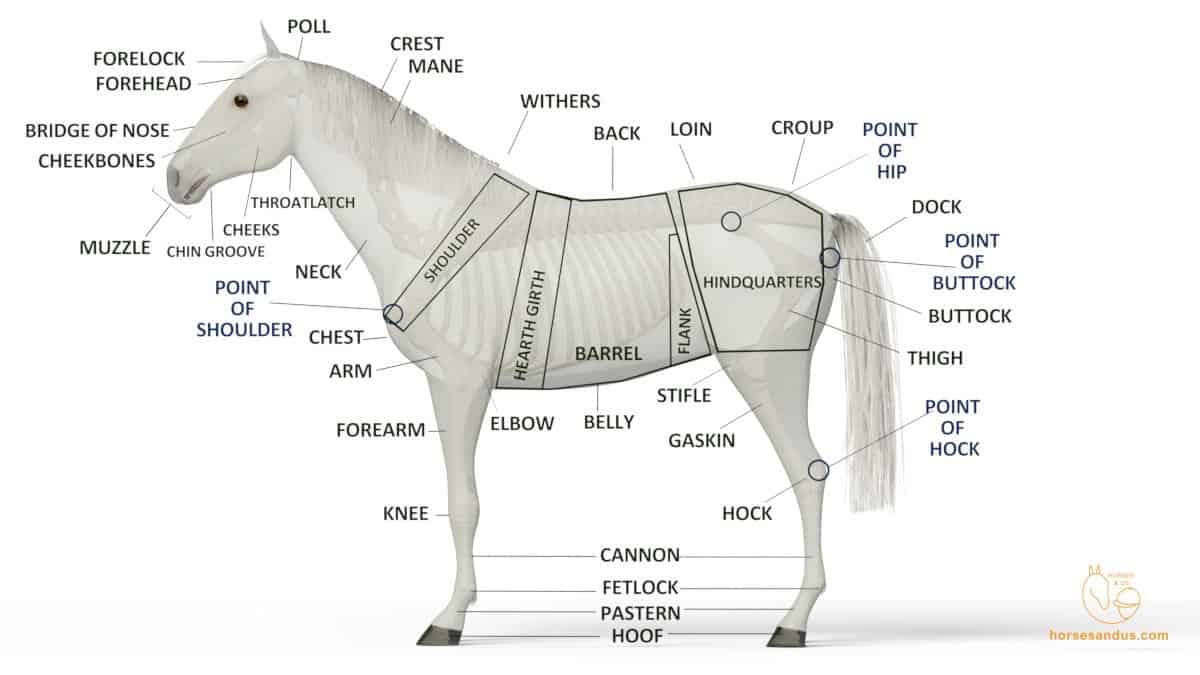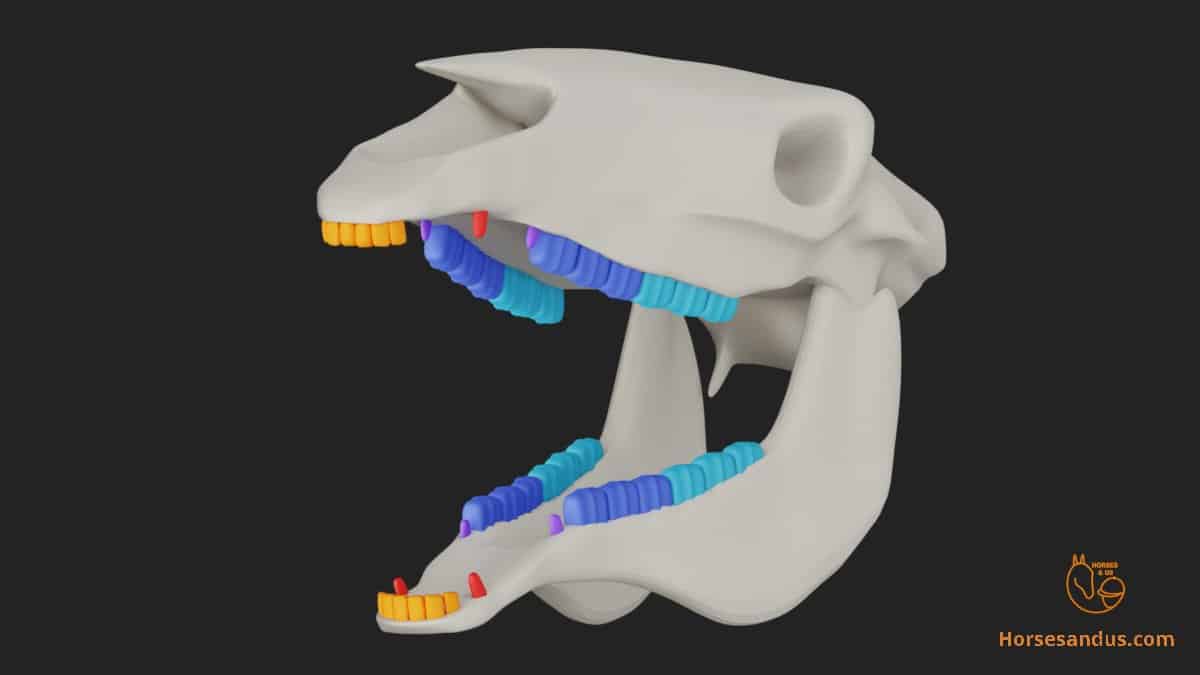Horses are prey animals that rely on their senses to keep them safe from predators. But the wind disrupts a horse’s ability to clearly hear, see, and smell, reducing its capability to detect predators. This causes horses to become anxious because they perceive danger, explaining why they spook in the wind.
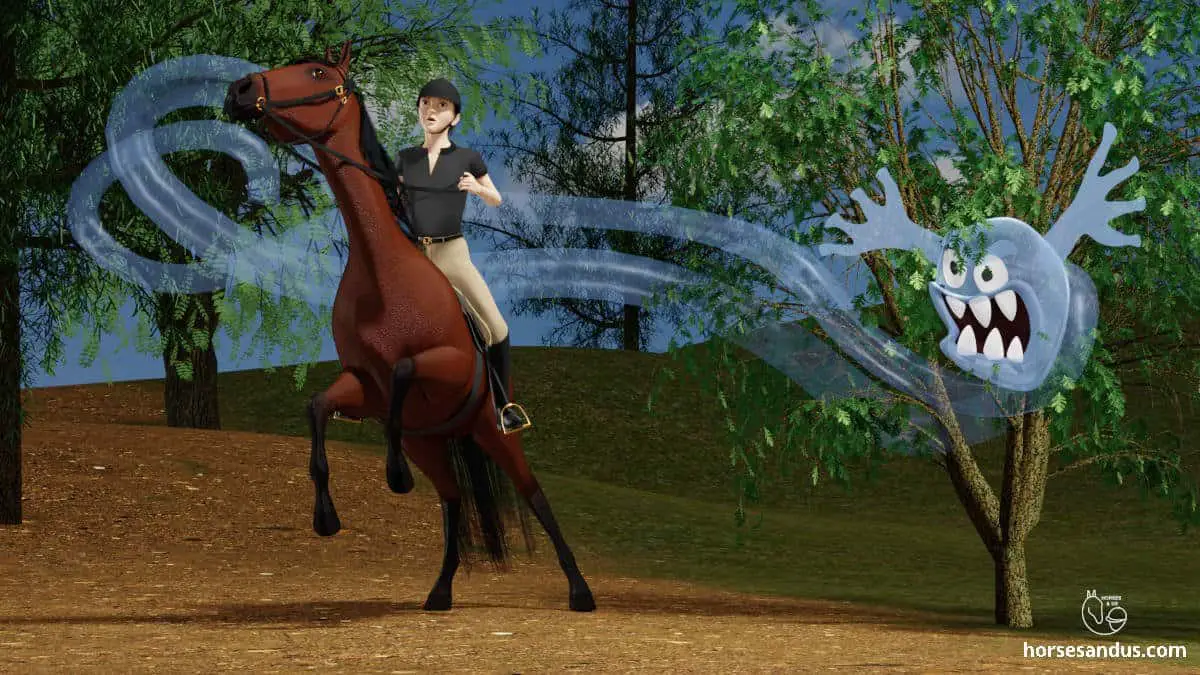
Horses Survived by Being Extra Vigilant
Being prey animals, horses have evolved to survive by always being vigilant to dangers and capable of immediate flight if they perceive a threat.
Horses can hear sounds and perceive movements that humans may not detect. This is why sometimes we are surprised and don´t understand why horses spook in the wind and may even attribute their reaction to bad behavior.
Riders pass their stress to horses
When horses are being ridden, their nervousness is usually intensified. In addition to the stress caused by the wind, they are also stressed by the rider, especially if the rider is inexperienced.
We should learn to understand why horses spook in the wind and accept that they may behave differently in windy conditions.
Once the horse is in flight mode, it is difficult to control and dangerous to the rider or other nearby people. So if we are not confident to ride on windy days, we should avoid it and work instead on other ground activities, such as lunging.
How Wind Affects the Horse’s Senses
To better understand how the wind affects the horse’s senses, we will quickly explain each of the horse’s senses and then describe how it impacts each one.
The Horse’s Vision
The horse’s vision is different from ours. They can see almost panoramically because their eyes are placed laterally. They can see two things at once, one from each eye. This allows them to graze while at the same time detect predators around them.
A horse’s vision is its primary detector of danger. They have an acute ability to detect any movement around them.

The Effect of Wind On The Horse’s Vision
Horses are more excited on windy days because they see movement all around them. Things that are normally still are now moving and perceived as a threat.
- The wind causes the physical environment to move by blowing objects such as leaves, bushes, debris, etc. This reduces the contrast of a moving predator within a motionless environment. Making it more difficult for the horse to spot the predator, thus stressing him.
- The wind blows objects in the air that can suddenly appear in the sight of the horse and frighten him
The Horse’s Hearing
A horse’s hearing is more acute than ours. They can hear within a larger frequency range than we can. Their frequency range is from 14hZ to 25 kHz, while the human range is 20 Hz to 20kHz (source).
Their ears move 180 degrees, and they can focus on a single area to listen to. This allows the horse to identify where the sound is coming from.

The Effect of Wind On The Horse’s Hearing
Horses are more stressed and spook on windy days because they hear many different sounds and cannot identify predators.
- The sound of wind masks other sounds in the environment, which stresses the horse because it cannot clearly hear predators
- The wind also creates additional sounds made by objects blowing in the wind, such as leaves, debris, etc. This can frighten the horse because it may perceive these sounds as being a predator.
The Horse’s Smell
As prey animals, horses have the ability to detect even the slightest scent of danger. They can also detect the “smell of fear” in other animals (which emanate chemical signals that we cannot detect).
Additionally, horses can clearly identify the direction from which the smell is coming. This is possible because of how the brain and smell receptors in the nostrils are structured (source).
The Effect of Wind On The Horse’s Smell
Windy conditions affect the horse´s smell in the following way:
- High-speed wind carries the smell of other animals in all directions and affects the horse’s ability to detect the location of predators through smell. The disruption of smell increases with the speed of the wind. While no wind fails to disperse scent at all, a high wind speed dilutes it very quickly.
An interesting article about the perceptual world of horses can be found here.
The Effect of Wind Speed on The Horse’s Senses
Studies show that the effect of wind speed on predator detection differs across the different senses.
The auditory and visual senses are linearly related to wind speeds. The detection capability of the senses decreases with wind speed.
The relation of the olfactory sense to wind speed is a humped curve. The absence of wind and high wind speed impair smell detection, while mild wind increases smell detection.
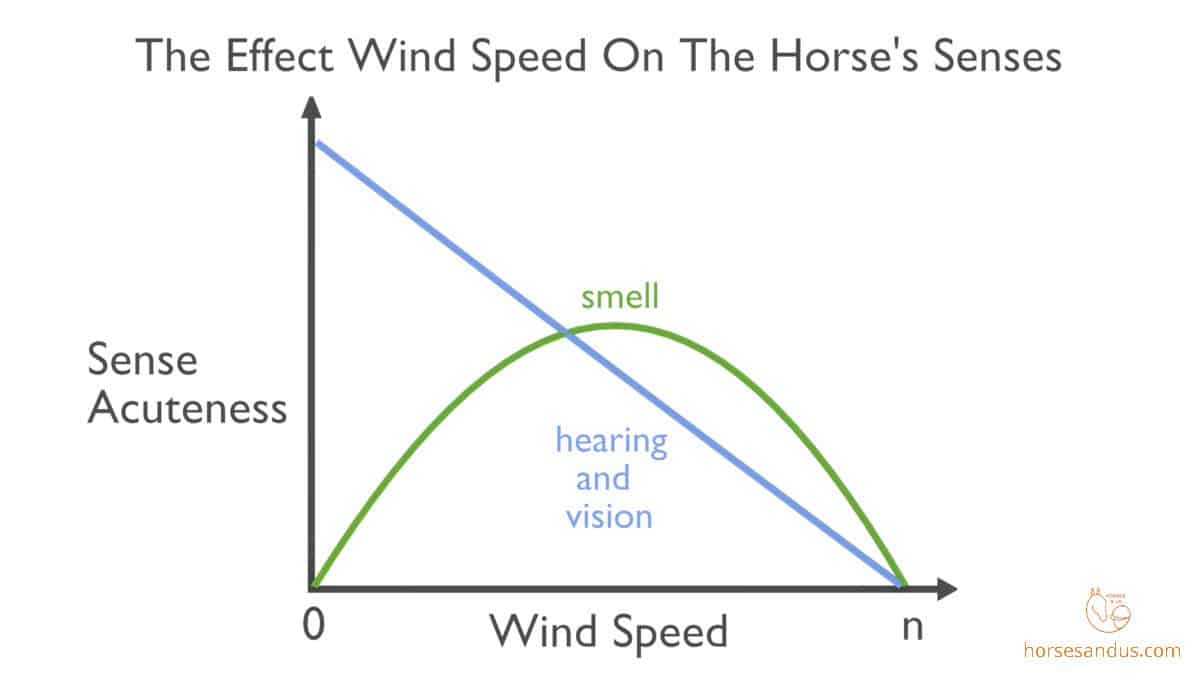
Horse Herd Behavior In Windy Days
Normally, horses are spread out in the pasture, but they will come closer to each other on windy days, forming a group.
In windy conditions, the horse’s ability to detect predators is reduced, making them feel unsafe. Instinctively, they will group with the other horses from the herd to feel more protected from danger.
Bigger Groups Lower The Risk For Each Horse
Increasing the group size reduces the risk of being attacked by a predator because of two main reasons:
- The risk of a predator attack is divided among the horses in the group. This dilutes the risk of each individual horse. The bigger the group, the lower the risk for each horse.
- The overall group vigilance and the capacity to detect a predator is increased. Based on the premise that many pairs of eyes are more efficient at detecting a predator.
Eating and Vigilance tasks are shared within the Group
Another important fact that we must not forget is that horses need to eat constantly. Their digestive system is designed to process only small amounts of food.
When horses are grouped, feeding and vigilance tasks can be divided and rotated among the group members without reducing the group’s ability to detect a predator.
This makes it possible for horses to continue eating while benefiting from the group’s vigilance on windy days.
Source: https://link.springer.com/article/10.1007/s00265-016-2075-5
Do Some Horses Spook in the Wind More Than Others?
Normally sudden noises are likely to trigger a flight reaction in most horses. The closer the noise, the more severe the reaction is.
However, the horse’s temperament, familiarity with the environment, and confidence in the rider will affect how the horse reacts to the wind.
Effect of Environment and Training on Horse’s “Spookiness”
If horses live in an environment where noises are frequent or are deliberately exposed to certain noises when they are being trained, they will become accustomed to hearing sudden noises and may be less likely to spook in the wind.
The horse´s “spookiness” will also depend on the type of noise and how similar it is to a natural predator. For example, the rustling of leaves is more easily associated with a predator’s movement than the noise of a car or train. Actually, many horses are unperturbed by motor traffic, even when heard or seen for the first time.
Effect of Horse’s Temperament on Its “Spookiness”
The horse’s temperament can influence how a horse spooks in the wind.
Some horses are very fearful and tend to spook easily. Any sudden noise or movement caused by the wind makes them panic. This sudden reaction can catch the rider off guard.
Other horses are courageous, and even if they are terrified. They will maintain a calm appearance and not enter flight mode.
Effect of Rider on Horse’s “Spookiness”
The confidence the horse has in the rider is an important factor in controlling his spookiness. Many horses lack confidence in windy conditions, which will be exacerbated if the rider is also anxious. The rider’s added tension will create more anxiety in the horse and cause it to spook in the wind more easily.
How Do You Train A Horse To Not Spook in the Wind?
No amount of training can completely take away what Mother Nature has instilled in horses for their survival. But with time, lots of patience, and proper training, you can control the horse´s “spookiness” to some level.
Taking Advantage of the Herd Instinct for Training
This can be possible because of the horse’s herd instinct. As explained above, in adverse weather conditions, a horse feels safer when closer to other horses in the herd.
If you learn to communicate properly with your horse, you essentially become a herd of two. As the herd leader, the horse will come to trust you to keep it safe in threatening situations.
Training Should be Done Gradually and with Patience
Training a horse to be confident in windy conditions should start in a familiar place with an experienced rider where the horse feels safe. The horse should be exposed to adverse conditions gradually, and with patience, so they may get accustomed to strange sounds and objects.
This training should be started when the horse is still young, as it is easier to remove spooky behavior that has not yet become ingrained.
This wonderful book, Horses Never Lie: The Heart of Passive Leadership uses real stories to teach us how we can become the leader of our horses. It can be purchased on Amazon here.
The Training Environment Should Not Avoid Distractions
However, many horses are trained in conditions that have no distractions. Such as wind blowing, dogs barking, cars driving, etc. But this is merely an avoidance strategy. It does not help the horse get over its fears to become confident and safe for riding.
Since bad weather sometimes comes unexpectedly and we cannot always plan to ride without distractions. It is better to train the horse to remain relaxed and trustworthy in adverse conditions.
In any case, we must always remain observant when riding a horse. Even the calmest horse with the best training can still spook in some situations.
Training of Police and Military Horses
Police and military horses are extreme examples of horses trained for adverse conditions.
These horses are very carefully selected, and highly skilled experts perform their training.
The following video explains different temperaments in horses and how some are really brave and can be trained to manage very adverse situations.
Sources
Social Referencing in the Domestic Horse
How reliable is temperament assessment in the domestic horse
Effects of wind on predator-prey interactions
